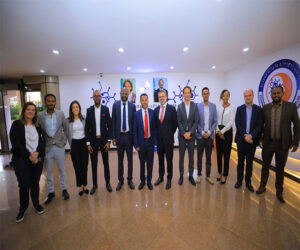University of South Florida researchers are using artificial intelligence to revolutionize mosquito surveillance to help combat malaria in Africa.Ryan Carney , associate professor of integrative biology, and Sriram Chellapan , professor in the department of computer science and engineering,will collaborate with an interdisciplinary team of researchers to advance malaria research and explore innovative solutions to target malaria-infected mosquitoes in real-time.
The project is part of an international effort funded by a 3.6 million dollars grant from the National Institute of Allergy and Infectious Diseases, part of the National Institutes of Health. Known as EMERGENTS (Enhancing Malaria Epidemiology Research through Genomics and Translational Systems), the project will establish a new International Center for Excellence for Malaria Research in west-central Africa, with in-country expertise in Nigeria and Cameroon. According to the World Health Organization, in 2022, there were 249 million new cases of malaria globally and 608,000 resulted in death. Africa is disproportionately affected by the disease, accounting for 95% of the world’s 2022 malaria deaths.
Over the next five years, the international center will advance evidence-based strategies for malaria eradication and elimination, including training a new generation of African Scientists, better understanding of insecticide resistance and investigating the geographic expansion of Anopheles stephensi, a dangerous urban malaria vector that has recently started to invade Africa.
The information gathered at the center will be used for global management of malaria. While the primary focus of the EMERGENTS initiative is Africa, the technology and methodologies developed through this project have significant implications for the United States. Florida, with its conducive climate and high rate of international travelers, remains a critical point for monitoring mosquito-borne illnesses.
Using some of the same unique algorithms, Chellappan is testing an artificial intelligence-enabled smart trap that will lure, capture and monitor Anopheles stephensi. The goal is to deploy multiple prototypes of the patent-pending smart trap throughout west-central Africa during this project to specifically trap and automate the identification of Anopheles stephensi instantaneously.
As the technology advances throughout this project, Chellappan hopes the traps can be sold to citizens at an affordable price to further enhance community-led mosquito surveillance and control both abroad and locally.
Source: Health News Florida




